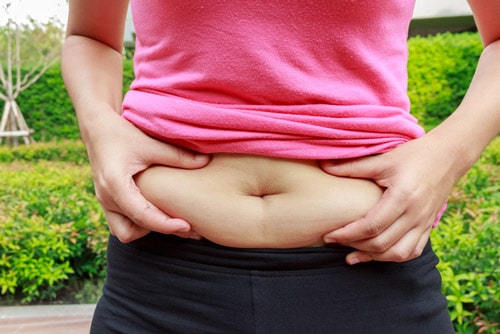Learn how to identify the difference between bloating and fat.
Wiki Article
Discovering the Difference In Between Bloating and Fat: Vital Insights for Better Digestive Health And Wellness
Understanding the distinction in between bloating and body fat is crucial for individuals seeking to enhance their digestive health and wellness. While bloating is frequently a transient condition linked to nutritional behaviors, body fat stands for an extra steady aspect influenced by long-term lifestyle choices.Understanding Bloating

Moreover, bloating can be aggravated by conditions such as irritable digestive tract syndrome (IBS) or food intolerances, where the gastrointestinal system struggles to refine certain compounds effectively. Consuming too swiftly, consuming carbonated drinks, or overeating can likewise trigger bloating by enhancing the quantity of gas and food within the stomach and intestinal tracts.
Anxiety and hormone changes can affect gut mobility and add to bloating. Recognizing the triggers certain to an individual's way of life and diet regimen is vital for handling this problem. In general, recognizing the multifaceted reasons of bloating is essential for developing efficient approaches to reduce pain and improve digestion wellness.
What Is Body Fat?
Body fat, an important element of human physiology, offers multiple features past just being a source of power storage. Made up generally of adipocytes, or fat cells, body fat plays a vital function in preserving general health and wellness. It is classified into two key kinds: subcutaneous fat, located just below the skin, and visceral fat, which borders internal body organs. Each type has unique ramifications for wellness and metabolism.Along with energy storage space, body fat is integral to hormone law, insulation, and defense of important organs - fat vs bloating. It works as a reservoir for fat-soluble vitamins, such as A, D, E, and K, facilitating their absorption and metabolic application. Furthermore, adipose tissue is metabolically active, generating hormonal agents like leptin and adiponectin, which are associated with cravings policy and insulin level of sensitivity.

Body fat additionally contributes in thermoregulation, assisting to maintain body temperature level. While some quantity of body fat is necessary for wellness, extreme buildup can cause problems such as obesity, diabetes mellitus, and heart disease. Understanding the complexities of body fat is essential for advertising better wellness and protecting against disease, stressing the significance of balanced body make-up.
Trick Distinctions In Between Bloating and Fat
Typically misunderstood, bloating and body fat are two distinct conditions that can impact an individual's look and comfort. Bloating refers to an awkward swelling in the abdominal area brought on by excessive gas or fluid retention, leading to a temporary rise in size. This problem can rise and fall throughout the day, often connected to nutritional options or digestive concerns, and is identified by sensations of volume or pressure.In comparison, body fat is a steady element of body structure, standing for saved energy and playing a vital function in different physical functions. Unlike bloating, body fat does not generally vary rapidly and is affected by long-lasting nutritional habits, activity degrees, and metabolic factors. It builds up over time, adding to total body shape and health and wellness.
In addition, while bloating can trigger discomfort and might be alleviated through dietary adjustments or way of life modifications, body fat decrease typically needs a much more extended commitment to diet and exercise - fat and bloating. Acknowledging these distinctions is important for understanding one's body and managing wellness effectively, as each condition requires unique techniques for improvement and alleviation
Root Causes Of Bloating
Bloating can arise from a selection of underlying aspects, each adding to the uneasy feeling of fullness and abdominal swelling. One main reason is the intake of air, which can occur while eating or consuming also quickly. This excessive air can collect Discover More Here in the digestive system system, leading to discomfort.In addition, specific foods are well-known for creating bloating, particularly those high in fiber, such as beans, lentils, and cruciferous veggies. These foods can lead to enhanced gas manufacturing throughout food digestion. Lactose intolerance is another considerable factor, as individuals lacking the enzyme lactase might experience bloating after taking in dairy products.
Furthermore, sweetening agents, particularly sugar alcohols, can disrupt digestive tract function and trigger bloating. Gastrointestinal conditions, such as short-tempered bowel disorder (IBS) and gastric illness, can also manifest as bloating because of damaged digestion or swelling.
Hormonal fluctuations, specifically throughout menstruation, can cause temporary bloating too. Stress and anxiety and stress and anxiety can intensify digestion concerns, better adding to the feeling of bloating. Understanding these reasons is important in resolving and easing this usual discomfort.
Tips for Taking Care Of Digestive Health And Wellness
Resolving the variables that contribute to bloating is just the beginning of advertising much better digestive system health. Foods such as fruits, veggies, and whole grains advertise normal bowel movements and decrease the likelihood of irregularity, an usual trigger for bloating.Hydration plays a crucial role too; ample water consumption helps the digestion system function ideally and can minimize bloating. fat vs bloating. Furthermore, exercising conscious consuming-- such as chewing food extensively and eating gradually-- can help in food digestion and reduce air swallowing, which usually intensifies bloating

Lastly, including probiotics right into your regimen, whether their explanation through supplements or fermented foods, can promote a healthy gut microbiome, even more sustaining digestive procedures. By embracing these techniques, individuals can attain a more well balanced and comfortable gastrointestinal experience.

Conclusion
In verdict, distinguishing in between bloating and body fat is important for maximizing gastrointestinal health and wellness and overall well-being. Bloating, commonly a short-lived problem linked to nutritional selections, contrasts Read More Here with body fat, which mirrors lasting lifestyle habits.Report this wiki page